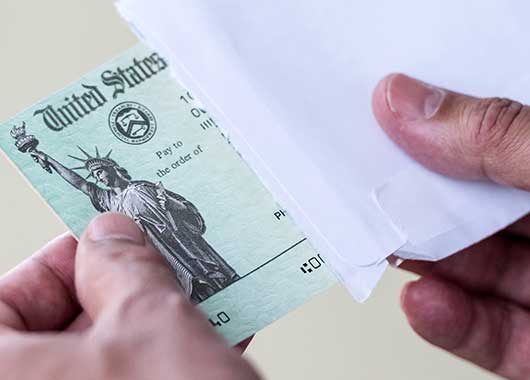During uncertain times, it can feel like everyone has an update or information to provide to you. Unfortunately, this can lead to information overload, and a sense of not knowing what information is correct, or where to even look for the correct information. During this time, it is important to know how to stay informed, and know where to go when you have questions.
The CARES Act
Under the CARES Act, individuals with income of up to $75,000, or married couples earning up to $150,000 annually, will be receiving payments of $1,200 with an additional $500 payment per minor child. The payments decrease ratably and stop altogether for single workers making more than $99,000, and $198,000 for married workers. Eligibility will be based on 2019 or 2018 tax returns, or on the 2019 Social Security statements.
If the IRS does not currently have your direct deposit information, the Treasury plans to develop a web-based portal for individuals to provide their banking information to the IRS online, so that individuals can receive payments immediately as opposed to checks in the mail.
For ongoing updates in regards to the CARES Act, please see the IRS website at www.irs.gov/newsroom/economic-impact-payments-what-you-need-to-know.
Watch Out For Fraud
The Treasury Inspector General for Tax Administration has urged taxpayers to be on high alert for potential scams related to government assistance to taxpayers impacted by the coronavirus, and has provided a few steps for avoiding scams during this time:
- The IRS is not going to contact you by telephone to ask you for your personal identification or financial information in order to provide you with an economic impact payment.
- The IRS will never contact you and ask you to make any kind of payment using an iTunes card, gift card, prepaid debit card, money order, or wire transfer.
- The IRS will never request personal or financial information by e-mail, text messages, letters, or any social media.
- If you receive a call from someone claiming to be from the IRS asking for your personal identification or financial information in exchange for an economic impact payment, take the following action:
- Hang up.
- If you owe Federal taxes, or think you might owe taxes, call the IRS at 1-800-829-1040. IRS employees can help you with your payment questions.
- If you do not owe taxes, report suspicious communications on TIGTA’s website at www.TIGTA.gov, and follow the prompts to report IRS-related coronavirus scams.
Taxpayers should be alert to phone and e-mail scams that use the IRS name and logo. Forward suspected scam e-mails to phishing@irs.gov. Do not open any attachments or click on any links in those e-mails. Also, be aware of other unrelated scams (such as saying you are a lottery or sweepstakes winner) and solicitations (such as debt relief offers) that fraudulently claim to be from the IRS.
Staying Informed
- For up-to-date information about eligibility, where your payment will be sent, and any further action for you to receive payment, visit www.irs.gov/newsroom/economic-impact-payments-what-you-need-to-know.
- The IRS has also established a special section focused on steps to help taxpayers, businesses and other affect by the coronavirus. This page will be kept updated at www.irs.gov/coronavirus.
- Other information about actions being taken by the U.S. government is available both in English at https://www.usa.gov/coronavirus and Spanish at gobierno.usa.gov/coronavirus.
- You can find additional information directly from the U.S. Department of the Treasury regarding Assistance for Small Businesses and COVID-19 Scams at home.treasury.gov/coronavirus.
- For COVID-19 news, updates, and recommendations, visit the CDC’s website at www.cdc.gov/coronavirus/2019-nCoV/index.html.



